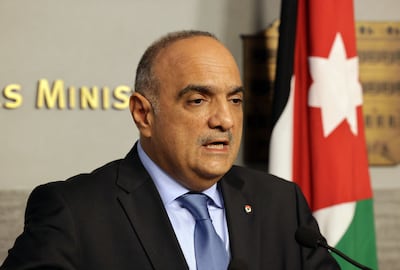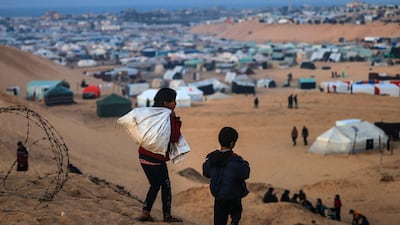Live updates: Follow the latest news on Israel-Gaza
Jordanian Prime Minister Bisher Khasawneh has blamed “a handful” of Israeli politicians for the breakdown of a two-state solution.
Speaking at an event in London about the Israel-Gaza war, Dr Khasawneh said Israel was being overly influenced by a small number of politicians with extremist views, who were leading the country into “perpetual” war.
“It’s been politically beholden by small domestic political calculations of a few in Israel, who propagate and promulgate that the answer is in a security solution,” he said.
Dr Khasawneh criticised suggestions that blame for lack of progress towards peace could be apportioned equally.
“I don’t know whether it is both sides. I caution that there is one side – and it's not the entirety of that one side – that’s not embracing of the two-state solution,” he said.
The Arab world and Islamic countries had shown a clear willingness to embrace a two-state solution since the Saudi-led Arab Peace Initiative in 2001, he added.
His comments came after Israeli Prime Minister Benjamin Netanyahu openly defied US President Joe Biden’s calls to revive the peace process after the war.
“A handful of Israeli politicians have been left to go in a different direction. One of perpetual conflict, of wanting to have their cake and eat it at the same time,” Dr Khasawneh said.
He cautioned that Israeli leaders’ rejection of a two-state solution was “detrimental” to Israel’s security in the long term.
Jordan’s peace treaty with Israel has come under strain during the war, with politicians repeatedly warning against the forced displacement of Palestinians from Gaza.
A group of LSE’s students had gathered outside the event to protest Jordan’s ties with Israel, calling for the Israeli embassy in Amman to be closed.
Arab leaders will be meeting with the EU's foreign affairs council in Brussels next week to discuss the Israel-Gaza war and the deteriorating humanitarian situation in Gaza.
Dr Khasawneh said an immediate ceasefire was needed to end the “carnage” in Gaza.
“The argument that this is a translation of self-defence is cowardice,” he said.
Israel’s war risked radicalising future generations, and had already directly affected Jordan’s economy, and those of other neighbouring countries.
The international community’s “rules based order” was also at risk, as the Palestinian death toll continues to rise with seeming impunity for Israel.
“The international powers are under obligation – in the context of preserving the international rules based system – to tell the Israeli government that this needs to stop and should have stopped yesterday, and move away from the vicious cycle of violence,” he said.

Arab states refuse to “sign up” to a plan for the day after the war, without assurances of a “serious” and “time-lined” peace process, which sees the creation of two states according to the pre-1967 borders, and an end to Israeli occupation.
“Nobody will be willing to jump on an agreement that only addresses the security concerns of the Israelis,” he said.
“We have to committed and serious in reaching that objective.”


